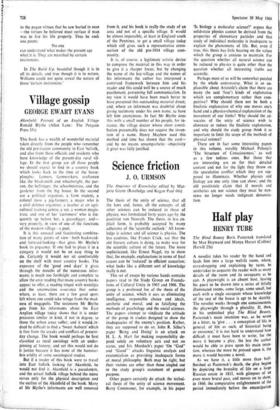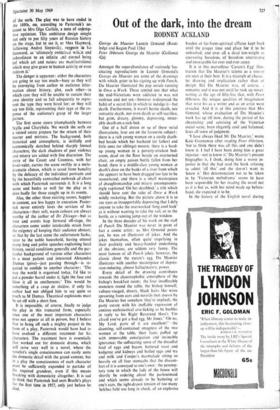Half play
HENRY TUBE
The Blind Beauty Boris Pasternak translated by Max Hayward and Manya Harari (Collins! Harvill 25s) A novelist takes his reader by the hand and leads him into a large well-lit room, where, eavesdropping and explaining by turns, he undertakes to acquaint the reader with as many details of the room and its occupants as he can. A playwright is an absent host, leaving his guest to be drawn into a series of fitfully illuminated rooms, some large, some small, but each with a single occupant whose knowledge of the rest of the house is apt to be sketchy. The novelist works through one consciousness, the playwright through a plurality. If, then, in his unfinished play The Blind Beauty. Pasternak's main intention was, as he wrote in a letter, to 'give . . . a conception of life in general, of life as such, of historical being or existence,' it is not hard to understand how difficult it must have been to write; for the more it became a play, the less the author would be able to press upon his main inten- tion, whereas the more he pressed upon it, the more it would become a novel. As we have it, a little more than half finished at Pasternak's death, the play begins by depicting the brutality, of life OB a lacgo Russian estate in 1835, with glimpses of an even more brutal past, and moves on to shoW, in 1860, the comparative enlightenment of the period immediately before the emancipation
ot the serfs. The play was to have ended in the 1880s, on, according to Pasternars ac- count to Mrs Olga Carlisle, a note Of redethp- live optimism. This ambitious _design sought not only to put fifty years of- Russian history on the stage, but to see it, as Max Hayward, following Andrei Sinyavsty, suggests in lals foreword, as 'ultimately contained within and subordinate to an infinite and eternal being (of which art and nature are manifestations) which may give grace to human activity or even redeem it.'
The danger is apparent: either the characters are going to say too much—busy as they will be conveying from author to audience infor- mation about history, plot, each other—in which case they will be unable to sustain their
own identity and so fail adequately to repre- sent the type they were hired -for; or they will say too little, representing their type at the ex- pense of the audience's grasp of the larger picture.
The first scene steers triumphantly between Scylla and Charybdis. We watch the serfs on a ruined estate prepare for the return of their master and mistress. The background, both historical and atmospheric, is skilfully and economically sketched behind sharply limned characters; the dark shadows of past violence arid misery are added with fine discretion. The entry of the Count and Countess, with her lover-valet, carries the scene swiftly to a melo- dramatic climax, which is saved from banality by the delicacy of the individual portraits and by the beautifully controlled outbreak of chaos with which Pasternak surrounds it. It is a long scene and bodes as well for the play as it does badly for those caught up in its events.
Alas, the other three existing scenes, happier in content, are less happy in execution. Paster- nak never entirely loses the services of his characters—their soft, warm colours are always worthy of the author of Dr Zhivago—but as time and events leap forward off-stage, the characters come under intolerable strain from the exigency of keeping their audience abreast; so that by the last scene the unfortunate Sasha, tutor to the noble household, having uttered many long and polite speeches explaining local history, social conditions generally and the par- ticular background of various other characters to a most patient and interested Alexandre Dumas (pere)—just passing through—is re- quired to confide to another character: The way the world is organised today, I'd like to put a powder barrel under it, light the fuse and blow it all to smithereens.' This would be something of a coup de thedtre, if only his author had not obliged him to say quite so much to M Dumas. Theatrical explosions must be set off with a short fuse.
It is impossible, of course, finally to judge the play in this truncated form, especially
since one of the most important characters does not appear at all in person, but I believe
that to bring off such a mighty project in the form of a play, Pasternak would have had to have evolved a different treatment for his characters. The treatment here is essentially that worked out for domestic drama, which Will serve very well in a novel, where the novelist's single consciousness can easily unite the domestic detail with the grand context, but in a play the consciousness of each character must be sufficiently expanded to partake of the required grandeur, even if this means breaking with domesticity altogether. It is sad to think that Pasternak had seen Brecht's plays for the first time in 1957, only just before he died.



































 Previous page
Previous page